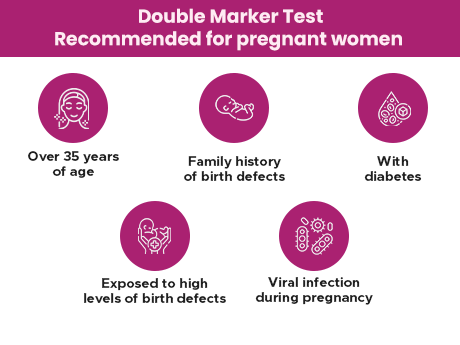
Pregnancy is a time of excitement, anticipation, and, let’s face it, a little anxiety too.
Pregnancy is a time of excitement, anticipation, and, let’s face it, a little anxiety too. As an expecting mother, you want to ensure the best possible health for your baby, and that means staying informed about the tests that can give you peace of mind. One such important test is the double marker test. Whether you're hearing about it for the first time or looking to understand it better, we’re here to break it down for you in simple terms. Double Marker Test Recommended for Pregnant Women
The double marker test in pregnancy is recommended for several groups of pregnant women:
Double Marker Test Recommended for Pregnant Women
The double marker test in pregnancy is recommended for several groups of pregnant women:
- Those over 35 years of age.
- Those with a family history of birth defects.
- Those with diabetes.
- Those exposed to a high level of birth defects risk.
- Those who have experienced a viral infection during pregnancy.
What is the Double Marker Test and Why Is It Important?
The double marker test is a type of blood test that helps assess the risk of certain chromosomal abnormalities in the fetus, such as Down syndrome. The ideal time to perform the double marker pregnancy test is between the 11th and 14th week of pregnancy—commonly known as the double marker test weeks. It is often combined with an ultrasound to provide more accurate results. Performing this screening at the right time allows health professionals sufficient scope to interpret the double marker test report accurately.
But why is this test so crucial? During pregnancy, your body produces various hormones and proteins, some of which can provide insights into your baby’s development. The double marker test in pregnancy measures two specific substances in your blood: free beta hCG and PAPP-A. By analysing these levels, doctors can estimate the likelihood of chromosomal issues. When expecting mothers take the double marker test in pregnancy, it significantly reduces uncertainty around the baby’s developmental health.
Tip: This test is non-invasive, meaning it only requires a blood sample, no need to worry about any procedures that might cause discomfort or risk to your baby.
How Does the Double Marker Test Procedure Work?
Understanding the double marker test procedure can ease any concerns you might have. The process is straightforward and quick:
Blood Sample Collection: Your healthcare provider will draw a small sample of blood from your arm. This is the only physical part of the test.
Lab Analysis: The blood sample is sent to a lab, where the levels of free beta hCG and PAPP-A are measured.
Ultrasound (Optional): Some doctors may recommend an ultrasound alongside the blood test. This can help create a clearer picture of the baby’s health.
The entire process is simple and over in a matter of minutes, allowing you to go about your day without much disruption.
What Can the Double Marker Test Tell You?
The double marker test report typically classifies the pregnancy as either ‘low-risk’ or ‘high-risk.’ The double marker test report analysis can be a bit technical, but your doctor will explain what the results mean in detail. Here’s a quick overview:
Low-Risk: Receiving a double marker test normal report or a low-risk report generally means the pregnancy has minimal probability of chromosomal defects. Such a double marker report will show Beta-HCG and PAPP-A levels within standard reference ranges.
High-Risk: If the levels are abnormal, it indicates a higher risk. However, this doesn’t mean there’s a definite problem. It simply means further testing, such as non-invasive prenatal testing (NIPT) or an amniocentesis, might be recommended.
Deviations from the double marker test normal values might signal increased risks, though this does not automatically mean a genetic anomaly is present, it just means further investigation may be required.
Example: Imagine the double marker test as an early warning system. If it detects something unusual, it alerts you to look deeper, but it doesn’t make a final diagnosis.
What Happens If the Results Are Concerning?
It’s natural to feel anxious if your results show a higher risk. But remember, the double marker test is just a screening tool. A high-risk double marker test report will lead healthcare providers to recommend more definitive follow-up tests. Your doctor may suggest additional tests, such as the NIPT blood test. This test can provide more detailed information by analyzing the fetal DNA found in your blood. It’s still non-invasive and can help confirm whether there’s an actual risk.
Additionally, consulting with a fetal medicine centre can provide you with specialized care and advice. Your healthcare provider will help you weigh the risks and benefits of further testing if your initial double marker test in pregnancy shows concerning findings. These centres focus on the health and development of the fetus and can offer more advanced testing and counselling.
Why Should You Consider Getting the Double Marker Test?
Choosing to undergo the double marker test procedure offers several benefits beyond early detection.
Peace of Mind: Knowing your baby is developing healthily can reduce anxiety during pregnancy.
Early Detection: The test helps detect potential issues early, allowing for better planning and decision-making.
Non-Invasive: Since it’s a simple blood test, it doesn’t pose any risks to you or your baby.
Getting the double marker test is an essential step in ensuring a healthy pregnancy. It’s a proactive measure that can provide valuable insights into your baby’s well-being. The dual marker in pregnancy test also helps healthcare providers design customized prenatal care strategies for mothers identified as high risk. This can involve heightened prenatal monitoring, specialized ultrasounds, and comprehensive genetic counselling, ensuring that you are fully prepared for all possible outcomes.
How Reliable Is the Double Marker Test?
While the double marker test for pregnancy provides crucial insights into fetal chromosomal health, it’s essential to recognize it as a screening tool, not a definitive diagnostic test. False positives or negatives can sometimes occur, though these instances are relatively rare. To increase reliability, healthcare providers often pair the dual marker test in pregnancy with detailed ultrasounds, checking parameters like nuchal translucency for more precise risk estimation.
Are There Any Precautions Required Before Undergoing a Double Marker Test?
No special preparation is needed before the pregnancy double marker test. Pregnant women undergoing this test do not need to fast or adjust their daily routines. It’s simply a standard blood draw that fits seamlessly into routine prenatal visits, ensuring no additional stress or complications for the expecting mother.
Support and Counselling After Receiving Double Marker Test Results
Receiving abnormal double marker test results can understandably be stressful. Our expert genetic counsellors at Garbh are available to help interpret the results. They will explain potential scenarios and guide you towards informed decisions. Professional counselling can significantly ease anxieties, clarify misconceptions, and empower you to make decisions comfortably.
Frequently Asked Questions (FAQs)
1. What is a double marker test?
The double marker test is a prenatal blood screening that measures two substances, Beta-hCG and PAPP-A, to assess the likelihood of chromosomal abnormalities like Down syndrome in the fetus.
2. What is a double marker test in pregnancy?
In pregnancy, the double marker test is an early screening tool performed between weeks 11-14, assessing the risk of fetal chromosomal conditions through maternal blood analysis.
3. Why double marker test is done?
This test identifies pregnancies at higher risk for certain genetic conditions, allowing healthcare providers to plan necessary interventions and counselling early in pregnancy.
4. How is the double marker test done?
The double marker test involves a simple blood sample from the mother’s arm. Lab specialists analyze Beta-hCG and PAPP-A levels to determine fetal risk for chromosomal abnormalities.
5. Is the double marker test safe?
Yes, the double marker test is completely safe and non-invasive, involving only a maternal blood sample, posing no risk whatsoever to the mother or baby.
6. What do I do if my double marker test shows high risk?
If results show high risk, further tests like NIPT or amniocentesis may be advised. Genetic counselling and professional consultations will guide your next steps clearly and effectively.
Taking the double marker test can significantly improve the pregnancy experience by providing clear, valuable information about your baby’s genetic health. Interpreting double marker test results helps you understand and manage the prenatal journey confidently. Whether your results indicate low risk or further testing is recommended, staying informed and proactive remains the best strategy for a healthy, worry-free pregnancy. With the right tests and compassionate care providers, such as those at Garbh, you’ll be well-equipped to embrace pregnancy confidently and joyfully.
Elevate Your Pregnancy Care with Garbh
Pregnancy is a journey filled with important decisions, and getting the right tests done is one of them. At Garbh, we understand the importance of accurate and timely testing, which is why we offer comprehensive support throughout your pregnancy. From the double marker test to advanced screenings, we’re here to ensure you have the information you need to make confident choices. With Garbh, you’re not just getting a test—you’re getting peace of mind, expert care, and a partner in your pregnancy journey.

